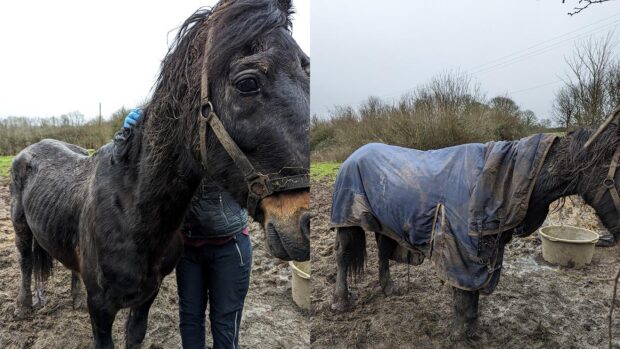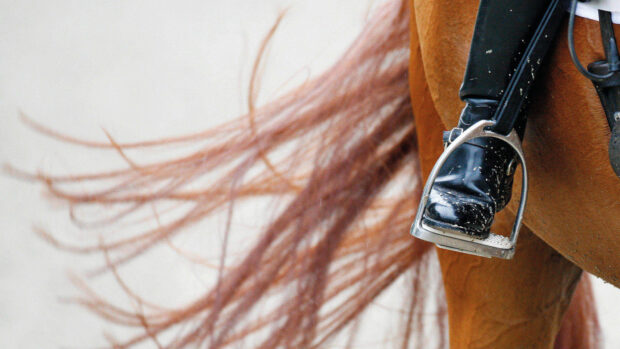Owners need to better understand why horses perform behaviours such as crib-biting and weaving, research has highlighted.
A dissertation, by University of Winchester animal welfare science, ethics and law student Stephanie Pluto, looked at abnormal repetitive equine behaviours such as box-walking, weaving, crib-biting and windsucking. Five participants, equine and animal researchers and professors answered three questionnaires on these behaviours, including owners’ understanding of why they are performed, whether horses experience obsessive thoughts comparable to humans and whether diagnosing these behaviours as a “manifestation of obsessive compulsive and related disorders” would be helpful to gain a more “sympathetic” understanding from owners.
The participants discussed the fact that although it is “possible” horses experience obsessive thoughts and there are “similarities between human and equine obsessions due to similar neurophysiologies”, the extent of horses’ thoughts cannot be fully understood, and obsessions are “likely to be emotionally different compared to humans” and “heavily influenced” by lifestyle. It was also agreed that the use of physical prevention measures such as anti-weave bars and anti-crib collars are a result of “a lack of understanding” of the behaviours among owners.
Ms Pluto told H&H that despite previous research on abnormal repetitive behaviours, many owners still refer to these as “vices” and she would like to see better understanding of why a horse is performing a behaviour.
“Sometimes these things are treated like punishable behaviours, but it’s not the horse’s fault. I hope things like anti-weave grills and anti-cribbing collars will be reconsidered and people will look at management changes instead. Previous research has shown that when you stop horses using these coping mechanisms, they either try to find another way to do it or they get even more stressed, which can make the behaviour worse,” she said.
“The main message to owners, when it comes to management decisions such as turnout, is to really consider what is best for the horse and not just convenient for the owner.”
The Horse Trust’s director of equine behaviour Gemma Pearson told H&H that caution needs to be taken when comparing human conditions to equine, as humans have a higher cognitive ability, and because when horses perform abnormal repetitive behaviours, it releases endorphins, which makes them feel better. But she said abnormal repetitive behaviour in horses and OCD in humans are both pathological conditions, and it is important to understand these behaviours in horses are not caused by boredom.
“In horses, these are coping mechanisms for stress, which usually comes from an abnormal environment,” she said. “The more we can find out about these behaviours, the more we can look for alternative treatments and provide more evidence to why we need to prevent them in the first place. Similar to a horse being starved or allowing their hooves to become overgrown, I would say allowing a horse to be that stressed for a long enough period of time to develop these abnormal behaviours is a major welfare concern.”
Ms Pearson believes owners are becoming more understanding and she does not see as many people using physical preventative methods such as anti-cribbing collars and anti-weave bars, but she said other abnormal repetitive behaviours are sometimes being missed.
“People are recognising weaving or box-walking, but what people don’t always recognise is the other abnormal repetitive behaviours, such as a horse sticking their tongue out, nodding their head up and down or chewing wood. A little bit of this can be normal, but when they’re doing it really obsessively, a lot of these are abnormal behaviours. Some people might laugh at some of the faces a horse can pull, when actually they’re probably a coping mechanism.”
You might also be interested in:

The health impact of behaviours such as crib-biting and weaving
Horses who crib-bite, weave and so on are often frowned upon in the equestrian world. But do some behaviours have

Vet’s tips to help calm an anxious horse
Is your horse stressy and anxious? Simple management strategies should help him settle, explains Kieran O’Brien MRCVS

5 reasons why a subscription to HorseandHound.co.uk makes the perfect last-minute gift
Horse & Hound magazine, out every Thursday, is packed with all the latest news and reports, as well as interviews, specials, nostalgia, vet and training advice. Find how you can enjoy the magazine delivered to your door every week, plus options to upgrade your subscription to access our online service that brings you breaking news and reports as well as other benefits.






